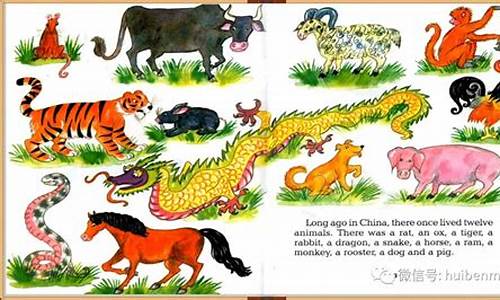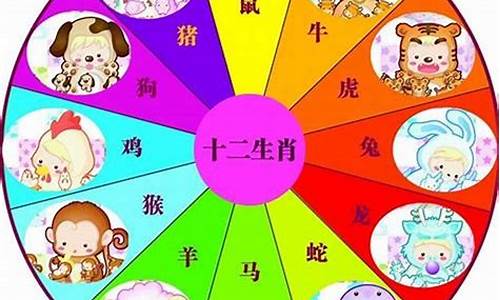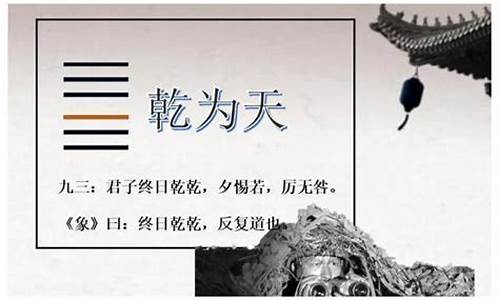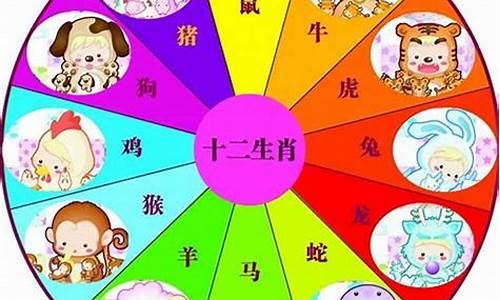您现在的位置是: 首页 > 生肖爱情 生肖爱情
十二生肖虎的英文介绍_英语版生肖虎的故事
tamoadmin 2024-06-06 人已围观
简介1.十二生肖英文介绍2.十二生肖的英文怎么写作文3.十二生肖文化英语介绍简短有哪些?4.英文版的十二生肖的来历和各自喻义5.急求英语介绍十二生肖animal sign?6.关于虎的文化有哪些?7.十二生肖英语单词大全及中文意思鼠Rat 牛Ox 虎Tiger 兔Rabbit 龙Dragon 蛇Serpent/ Snake 马Horse 羊Sheep 猴M 鸡Rooster 狗Dog 猪Pig 一.
1.十二生肖英文介绍
2.十二生肖的英文怎么写作文
3.十二生肖文化英语介绍简短有哪些?
4.英文版的十二生肖的来历和各自喻义
5.急求英语介绍十二生肖animal sign?
6.关于虎的文化有哪些?
7.十二生肖英语单词大全及中文意思

鼠Rat
牛Ox
虎Tiger
兔Rabbit
龙Dragon
蛇Serpent/ Snake
马Horse
羊Sheep
猴M
鸡Rooster
狗Dog
猪Pig
一. 鼠——Rat
英语中用以比喻讨厌鬼,可耻的人,告密者,密探,破坏罢工的人;美国俚语指新学生、下流女人。当看到smell a rat这一词组时,是指人们怀疑在做错某事。a rat race则表示激烈的竞争 。rats desert a sinking ship(船沉鼠先逃,这一谚语意指那些一遇到危险就争先寻求 安全或一看见困难便躲得老远的人。)
二. 牛——Ox
涉及“牛”的汉语成语很多,如“对牛弹琴”、“牛蹄之涔”等。英语中涉及“Ox”的表 达方式则不多。用Ox - eyed形容眼睛大的人;用短语The black Ox has trod on sb’s foot表示灾祸已降临到某人头上。
三. 虎——Tiger
指凶恶的人,虎狼之徒;英国人指穿制服的马夫;口语中常指比赛的劲敌。中国和东南亚国家常以Paper tiger比喻貌似强大而实质虚弱的敌人。词组ride the tiger表示以非常不 确定或危险的方式生活。
四. 兔——Hare
在英国俚语中,hare指坐车不买票的人。与hare组成的词组有:make a hare of sb.愚弄某人。start a hare。在讨论中提出枝节问题。例如:You start a hare ever time at the meeting.每次讨论你都提出与题无关的问题。英语中有许多关于兔的谚语,如:
1. First catch your hare.勿谋之过早(意指:不要过于乐观)。
2. You cannot run with the hare and hunt with hounde.不能两面讨好(意指:不要耍两面派)。
五. 龙——Dragon
龙在中国人民的心目中占有崇高的位置,有关龙的成语非常多,且含有褒义。如“龙跃凤鸣”、“龙骧虎步”等。在外国语言中,赞扬龙的词语非常之少,且含有贬义。如“dragon”指凶暴的人,严厉的人,凶恶严格的监护人,凶恶的老妇人等。以dragon组成的词组也多含贬义。如dragon’s teeth :相互争斗的根源;排列或多层的楔形反坦克混克混凝土障碍物。the old Dragon:魔鬼。
六. 蛇——Snake
指冷酷阴险的人,虚伪的人,卑鄙的人;美国俚语指追求和欺骗少女的男子或男阿飞。由 此看到,在英语中,“snake”往往含有贬义。如:
John’s behavior should him to be a snake.
约翰的行为表明他是一个冷酷阴险的人。
与snake组成的成语习语、谚语有许多,简举几例:
a snake in the grass.潜伏的敌人或危险。
to warm a snake in one’s bosom.养虎贻患,姑息坏人。Takd heed of the snake in the grass.草里防蛇。
七. 马——Horse
英美国家的人很喜欢马,因此,用“horse”这个词组成的词组、成语、谚语非常之多,此举几例:
1. get on the high horse.摆架子,目空一切。
2. work like a horse.辛苦的干活。
3. horse doctor.兽医、庸医。
4. dark horse.竞争中出人意料的获胜者。
如:The voters were surprised when the dark horse won the nomination.那个无名小卒在竞争中获胜时,投票者无不大吃一惊。
八. 羊——Sheep
英语中指害羞而忸怩的人,胆小鬼,驯服的人。有关sheep的谚语不少。
1. As well be hanged for a sheep as a lamb.
偷羊偷羔都是绞(死);偷大偷小统是贼 (意指:一不做,二不休)。
2. There’s a black sheep in every flock.
每一羊群里都会有一只黑羊,丑儿子家家有(意指:每个家里都会有个败家子。)
3. He that makes himself a sheep shall be eaten by the wolf.
甘心做绵羊,早晚喂 豹狼(人弱受人欺)。
4. The sheep who tallks peace with a wolf will soon be mutton.
羊向狼乞求和平,很快就会变成羊肉(意指,切勿向敌人乞求和平)。
九. 猴——M
1、m作名词时指顽童、淘气鬼,猴子似的人,易受欺的人。如:What are you doing, you young m !你在干什么呀,小捣蛋鬼!
2、m作动词时指胡闹、瞎弄、捣蛋。如:Stop ming about with the TV set !不 要瞎弄电视机!
3、与m一词搭配的词组、习语和俚语很多非常有趣。如:put sb’s m up.使某人生气,激怒某人;Your last word has really put his m up.你最后一句话实在使他大为生气;又如:make a m of愚弄;a m with a long tail.抵押;get the m off.戒除恶习;have a m on one’s back.毒瘾很深。
十. 鸡——Cock
指首领,头目,神气十足的人,与cock组成的词组多姿多彩,如:Cock of the walk / school.支配别人的人;a cock of the loft / dunghill.在小天地中称王称霸的人;Live like fighting cocke.生活很好,尤指吃得好;Cock - and - bull story.荒诞的故事, 无稽之谈。
用cock表达的谚语:It is a sad house where the hen crows louder than the cock.牝 鸡司晨,家之不祥(意指:丈夫软弱而一切由妻子作主的家庭是不会幸福的,当然这是一 种夫权思想)。
十一. 狗——Dog
汉语中常用“狗”比喻人,如“忠实走狗”、“看家狗”,成语“狗苟蝇营”、“狗彘不若”等。在英语中除了喻人外,还有丰富多彩的词组、谚语等。dog作名词时指无赖汉,坏蛋、废物,不受喜爱(或欢迎)的人。有时加形容词修饰可指各 种人,如:You dirty dog !你这个坏小子!a lucky dog.幸运儿;a dumb dog.沉默不语 的人,a sly dog.暗中寻欢的人和暗地里偷鸡摸狗的人;a dog in the manger.占着茅坑 不拉屎的人。
用dog表达的谚语:
1. Barking dogs seldom bite.吠犬不咬人(意指:对于高声发出恐吓,或惯于大声吼叫的人,勿须当真)。
2. Every dog has his day.凡人皆有得意日(意指:大家都有走运的一天)。
3. Dog does not eat dog.同类不相残;同室不操戈。
十二. 猪——Boar
在英语中boar一词指未阉割的公猪和公野猪,涉及猪的词语有pig(猪、小猪、野猪),hog(食用猪)、sow(牝猪),swine(猪:旧用法)。十二生肖用boar,比喻贪婪、肮脏、自私的人。
十二生肖英文介绍
The Twelve Chinese Zodiacs
The twelve Chinese Zodiacs, including eleven animals in the nature and a national totem, play an important role in the Chinese traditional culture. The twelve symbolic animals have their own characteristics. In the Year of Dragon or the Year of Tiger, people will say shenglonghuohu—full of vim and vigor; in the Year of Horse, people will say madaochenggong—to gain an immediate success. In Chinese eyes, pig is a “treasure”. Ox is a symbol of diligence, which is well presented in the verse by Lu Xun一an outstanding writer in China, “head bowed, like a willing ox I serve the children”.
十二生肖
十二生肖(the twelve Chinese Zodiacs)是中国传统文化的重要组成部分,它们源于自然界的11种动物和一个民族图腾(totem)。十二生肖代表动物的性格特点各不相同。到了龙年或虎年,人们常说“生龙活虎”;马年人们会说“马到成功”;猪在中国人的眼里是“宝”的意思;牛是勤劳(diligence )的象征,这一点在鲁迅的诗句“俯首甘为孺子牛”中有着完美的体现。
十二生肖的英文怎么写作文
十二生肖文化英语介绍简短是如下:
十二生肖,又叫属相,是中国与十二地支相配以人出生年份的十二种动物,包括鼠、牛、虎、兔、龙、蛇、马、羊、猴、鸡、狗、猪。
The zodiac, also known as the zodiac, is a Chinese Zodiac with twelve Earthly Branches to match the birth year of twelve animals, including rats, cattle, tigers, rabbits, dragons, snakes, horses, sheep, monkeys, chickens, dogs, pigs.
十二生肖的起源与动物崇拜有关。据湖北云梦睡虎地和甘肃天水放马滩出土的秦简可知,先秦时期即有比较完整的生肖系统存在。
The origin of the zodiac is related to animal worship. According to the Qin Bamboo Slips Unearthed from Shuihudi in Yunmeng, Hubei Province and Fangmatan in Tianshui, Gansu Province, there was a relatively complete Zodiac system in the pre Qin period.
最早记载与现代相同的十二生肖的传世文献是东汉王充的《论衡》。
The earliest record of the same Zodiac as modern literature is the Eastern Han Dynasty Wang Chong's Lun Heng.
十二生肖是十二地支的形象化代表,随着历史的发展逐渐融合到相生相克的民间信仰观念,表现在婚姻、人生、年运等。
With the development of history, the zodiac is gradually integrated into the concept of folk belief, which is reflected in marriage, life, year luck and so on.
每一种生肖都有丰富的传说,并以此形成一种观念阐释系统,成为民间文化中的形象哲学。
Each zodiac has rich legends, which form an interpretation system of ideas and become an image philosophy in folk culture.
现代,更多人把生肖作为春节的吉祥物,成为文化活动的象征。
In modern times, more people regard the Chinese Zodiac as the mascot of the Spring Festival and become the symbol of entertainment and cultural activities.
十二生肖文化英语介绍简短有哪些?
1. 十二生肖的英文分别怎么写
一. 鼠——Rat 英语中用以比喻讨厌鬼,可耻的人,告密者,密探,破坏罢工的人;美国俚语指新学生、下流女人。
当看到 *** ell a rat这一词组时,是指人们怀疑在做错某事。a rat race则表示激烈的竞争 。
rats desert a sinking ship(船沉鼠先逃,这一谚语意指那些一遇到危险就争先寻求 安全或一看见困难便躲得老远的人。) 二. 牛——Ox 涉及“牛”的汉语成语很多,如“对牛弹琴”、“牛蹄之涔”等。
英语中涉及“Ox”的表 达方式则不多。用Ox - eyed形容眼睛大的人;用短语The black Ox has trod on *** 's foot表示灾祸已降临到某人头上。
三. 虎——Tiger 指凶恶的人,虎狼之徒;英国人指穿制服的马夫;口语中常指比赛的劲敌。中国和东南亚国家常以Paper tiger比喻貌似强大而实质虚弱的敌人。
词组ride the tiger表示以非常不 确定或危险的方式生活。 四. 兔——Hare 在英国俚语中,hare指坐车不买票的人。
与hare组成的词组有:make a hare of *** .愚弄某人。start a hare。
在讨论中提出枝节问题。例如:You start a hare ever time at the meeting.每次讨论你都提出与题无关的问题。
英语中有许多关于兔的谚语,如: 1. First catch your hare.勿谋之过早(意指:不要过于乐观)。 2. You cannot run with the hare and hunt with hounde.不能两面讨好(意指:不要耍两面派)。
五. 龙——Dragon 龙在中国人民的心目中占有崇高的位置,有关龙的成语非常多,且含有褒义。如“龙跃凤鸣”、“龙骧虎步”等。
在外国语言中,赞扬龙的词语非常之少,且含有贬义。如“dragon”指凶暴的人,严厉的人,凶恶严格的监护人,凶恶的老妇人等。
以dragon组成的词组也多含贬义。如dragon's teeth :相互争斗的根源;排列或多层的楔形反坦克混克混凝土障碍物。
the old Dragon:魔鬼。 六. 蛇——Snake 指冷酷阴险的人,虚伪的人,卑鄙的人;美国俚语指追求和欺骗少女的男子或男阿飞。
由 此看到,在英语中,“snake”往往含有贬义。如: John's behavior should him to be a snake. 约翰的行为表明他是一个冷酷阴险的人。
与snake组成的成语习语、谚语有许多,简举几例: a snake in the grass.潜伏的敌人或危险。 to warm a snake in one's bosom.养虎贻患,姑息坏人。
Takd heed of the snake in the grass.草里防蛇。 七. 马——Horse 英美国家的人很喜欢马,因此,用“horse”这个词组成的词组、成语、谚语非常之多,此举几例: 1. get on the high horse.摆架子,目空一切。
2. work like a horse.辛苦的干活。 3. horse doctor.兽医、庸医。
4. dark horse.竞争中出人意料的获胜者。 如:The voters were surprised when the dark horse won the nomination.那个无名小卒在竞争中获胜时,投票者无不大吃一惊。
八. 羊——Sheep 英语中指害羞而忸怩的人,胆小鬼,驯服的人。有关sheep的谚语不少。
1. As well be hanged for a sheep as a lamb. 偷羊偷羔都是绞(死);偷大偷小统是贼 (意指:一不做,二不休)。 2. There's a black sheep in every flock. 每一羊群里都会有一只黑羊,丑儿子家家有(意指:每个家里都会有个败家子。)
3. He that makes himself a sheep shall be eaten by the wolf. 甘心做绵羊,早晚喂 豹狼(人弱受人欺)。 4. The sheep who tallks peace with a wolf will soon be mutton. 羊向狼乞求和平,很快就会变成羊肉(意指,切勿向敌人乞求和平)。
九. 猴——Monkey 1、monkey作名词时指顽童、淘气鬼,猴子似的人,易受欺的人。如:What are you doing, you young monkey !你在干什么呀,小捣蛋鬼! 2、monkey作动词时指胡闹、瞎弄、捣蛋。
如:Stop monkeying about with the TV set !不 要瞎弄电视机! 3、与monkey一词搭配的词组、习语和俚语很多非常有趣。如:put *** 's monkey up.使某人生气,激怒某人;Your last word has really put his monkey up.你最后一句话实在使他大为生气;又如:make a monkey of愚弄;a monkey with a long tail.抵押;get the monkey off.戒除恶习;have a monkey on one's back.毒瘾很深。
十. 鸡——Cock 指首领,头目,神气十足的人,与cock组成的词组多姿多彩,如:Cock of the walk / school.支配别人的人;a cock of the loft / dunghill.在小天地中称王称霸的人;Live like fighting cocke.生活很好,尤指吃得好;Cock - and - bull story.荒诞的故事, 无稽之谈。 用cock表达的谚语:It is a sad house where the hen crows louder than the cock.牝 鸡司晨,家之不祥(意指:丈夫软弱而一切由妻子作主的家庭是不会幸福的,当然这是一 种夫权思想)。
十一. 狗——Dog 汉语中常用“狗”比喻人,如“忠实走狗”、“看家狗”,成语“狗苟蝇营”、“狗彘不若”等。在英语中除了喻人外,还有丰富多彩的词组、谚语等。
dog作名词时指无赖汉,坏蛋、废物,不受喜爱(或欢迎)的人。有时加形容词修饰可指各 种人,如:You dirty dog !你这个坏小子!a lucky dog.幸运儿;a dumb dog.沉默不语 的人,a sly dog.暗中寻欢的人和暗地里偷鸡摸狗的人;a dog in the manger.占着茅坑 不拉屎的人。
用dog表达的谚语: 1. Barking dogs seldom bite.吠犬不咬人。
2. 十二生肖英语作文Aries
you are energetic and active ,but sometimes too impatient.
youlike to be the leader .some people think that you are selfish at times.
Taurus
you are stubborn and do not like change .you are a hard-work person.
you are patient and do not give up easily.
Gemini
you are a curious and clever person .you are outgoing.you love to talk.
Cancer
you are kind.you love your homeand family and like to take care of others.you like saving money and cooking.
Leo
you are a strong and confident person .youare generous. you like to buy your friends nice gifts.
Virgo
you are a modest person .you worry too much at times.you are practical and you always pay attention to details.
Libra
youare a polite and fair person .
you are elegant and love beautiful things.you love peace and do not like to like others.
Scorpio
you are a powerful person and have lots of energy .you like to keep secrets.however sometimes it is silly of you not to five others for their faults.
Sagittarius
you enjoy life and have a good sense of humour .you are often lucky.
you love tavelling to different places.
Capricorn
you are businesslike and are often successful.you are good at making or planning things .you are patient enough to wait without getting angry.
Aquarius
you are kind and wise.you have many friends.however,some people think that you are strange as you hate to be like anyone else and you try everything just to be different.
Pisces
you are geners ,kind,gentleandeasy-going.you are also creative and imaginative.you like to dream about everything.
3. 十二生肖的英文怎么写试读结束,如需阅读或下载,请点击购买> 原发布者:龙源期刊网 “生肖”也就是俗话说的“属相”,是中国人特有的一种表示出生时间的方式。
英语中,当谈个人出生的属相时,表达为“—What animal sign were you born under?(你属什么?)—I was born in the year of the Cock/ Mine is the Cock.(我属鸡。)”汉语中,人们往往以十二生肖中的动物来比喻人,即把不同(性格、特征、习性等)的人比作动物,如常以“毒如蛇蝎”来比喻心毒手辣的人,“笨猪”来比喻笨人,“胆小如鼠”来比喻胆小怯懦的人等。
英语中同样可用十二生肖中的动物喻人,其所表达的意思更加广泛而有趣。大家可以学习一下英语这方面的表达:一、鼠——Rat英语中用来比喻“讨厌鬼,可耻的人,告密者,密探,破坏罢工的人”。
*** ell a rat是指“觉得可疑;觉得情况不妙”。a rat race则表示“激烈的竞争”。
rats desert a sinking ship(船沉鼠先逃),这一谚语意指“那些一遇到危险就争先寻求安全或一看见困难便躲得老远的人”。二、牛——Ox涉及“牛”的汉语成语很多,如“对牛弹琴”、“牛蹄之涔”等。
英语中涉及“ox”的表达方式不多。用ox-eyed形容“眼睛大的人。
4. 十二生肖英文介绍Rat charm, 子鼠 Ox patient, 丑牛 Tiger sensitive, 寅虎 Rabbit articulate, 卯兔 Dragon healthy, 辰龙 Snake deep, 巳蛇 Horse popular, 午马 Goat elegant, 未羊 Monkey clever, 申猴 Rooster deep thinkers, 酉鸡 Dog loyalty, 戌狗 Pig chivalrous. 亥猪
扩展资料:
越南以猫替兔,印度有狮无虎,其余相同。韩国、日本生肖与中国相同。
柬埔寨和泰国与中国相同,但分别以牛和蛇打头。缅甸是八大生肖,周一到周日(周三细分上下午)出生的人分别属虎、狮、双牙象、无牙象、鼠、天竺鼠、龙、妙翅鸟。
西方生肖可追溯到古巴比伦:猫、犬、蛇、蜣螂、驴、狮、公羊、公牛、隼、猴、鳄、红鹤。埃及和希腊与之相似:牡牛、山羊、狮、驴、蟹、蛇、犬、猫(希腊为鼠)、鳄、红鹤、猿、鹰。
英文版的十二生肖的来历和各自喻义
1、The Chinese zodiac, also known as the zodiac, is one of the 12 animals in China that match the twelve Branches of the earth with the year of birth, including rats, cattle, tigers, rabbits, dragons, snakes, horses, sheep, monkeys, chickens, dogs and pigs.
十二生肖,又叫属相,是中国与十二地支相配以人出生年份的十二种动物,包括鼠、牛、虎、兔、龙、蛇、马、羊、猴、鸡、狗、猪。
2、The origin of the zodiac is related to animal worship. According to the Qin Bamboo Slips Unearthed in Hubei Yunmeng sleeping tiger land and Gansu Tianshui Fangmatan, there was a relatively complete Zodiac system in the pre-Qin period.?
十二生肖的起源与动物崇拜有关。据湖北云梦睡虎地和甘肃天水放马滩出土的秦简可知,先秦时期即有比较完整的生肖系统存在。
The earliest handed down document recording the same Zodiac as modern times is Lunheng written by Wang Chong of the Eastern Han Dynasty.
最早记载与现代相同的十二生肖的传世文献是东汉王充的《论衡》。
十二生肖介绍:
十二生肖是十二地支的形象化代表,即子(鼠)、丑(牛)、寅(虎)、卯(兔)、辰(龙)、巳(蛇)、午(马)、未(羊)、申(猴)、酉(鸡)、戌(狗)、亥(猪),随着历史的发展逐渐融合到相生相克的民间信仰观念,反映在婚姻、人生、年运等。
每一种生肖都有丰富的传说,并以此形成一种观念阐释系统,成为民间文化中的形象哲学,如婚配上的属相、庙会祈祷、本命年等。现代,更多人把生肖作为春节的吉祥物,成为文化活动的象征。
急求英语介绍十二生肖animal sign?
十二生肖在英语中的喻义
“生肖”是代替十二地支、用来表示人们出生的12种动物,即鼠、牛、虎、兔、龙、蛇、马、羊、猴、鸡、狗、猪。如寅年出生的人属虎,卯年出生的人属兔。“生肖”也就是俗话说的“属相”,是中国人特有的一种表示出生时间的方式,相当于西方的黄道十二星座(双鱼座、白羊座、金牛座、双子座、巨蟹座、狮子座、室女座、天秤座、天蝎座、人马座、摩羯麻、宝瓶座)。
英语中,当谈个人出生的属相时,表达为“What animal sign were you born under ?你属什么?I was born in the year of the Cock / Mine is the Coak.我属鸡。”十二生肖的12种动物在汉语中只有一个:鼠:Rat,牛:Ox,虎:Tiger,兔:Hare,龙:Dragon,蛇:Snake,马:Horse,羊:Sheep,猴:Monkey,鸡:Cock,狗:Dog,猪:Boar。
汉语中,人们往往以十二生肖中的动物来比喻人,即把不同(性格、特征、习性等)的人比作动物,如常以“毒如蛇蝎”,“笨猪”、“胆小如鼠”来比喻心毒手辣的人、笨人、胆小怯懦的人等。英语中同样可用十二生肖中的动物喻人,其所表达的意思更加广泛而有趣。现简述如下:
一. 鼠——Rat
英语中用以比喻讨厌鬼,可耻的人,告密者,密探,破坏罢工的人;美国俚语指新学生、下流女人。
当看到smell a rat这一词组时,是指人们怀疑在做错某事。a rat race则表示激烈的竞争。rats desert a sinking ship(船沉鼠先逃,这一谚语意指那些一遇到危险就争先寻求安全或一看见困难便躲得老远的人。)
二. 牛——Ox
涉及“牛”的汉语成语很多,如“对牛弹琴”、“牛蹄之涔”等。英语中涉及“Ox”的表达方式则不多。用Ox - eyed形容眼睛大的人;用短语The black Ox has trod on sb’s foot表示灾祸已降临到某人头上。
三. 虎——Tiger
指凶恶的人,虎狼之徒;英国人指穿制服的马夫;口语中常指比赛的劲敌。中国和东南亚国家常以Paper tiger比喻貌似强大而实质虚弱的敌人。词组ride the tiger表示以非常不确定或危险的方式生活。
四. 兔——Hare
在英国俚语中,hare指坐车不买票的人。与hare组成的词组有:make a hare of sb.愚弄某人。start a hare。在讨论中提出枝节问题。
例如:You start a hare ever time at the meeting.每次讨论你都提出与题无关的问题。
英语中有许多关于兔的谚语,如:
1. First catch your hare.勿谋之过早(意指:不要过于乐观)。
2. You cannot run with the hare and hunt with hounde.不能两面讨好(意指:不要耍两面派)。
五. 龙——Dragon
龙在中国人民的心目中占有崇高的位置,有关龙的成语非常多,且含有褒义。如“龙跃凤鸣”、“龙骧虎步”等。在外国语言中,赞扬龙的词语非常之少,且含有贬义。如“dragon”指凶暴的人,严厉的人,凶恶严格的监护人,凶恶的老妇人(尤指很少给在其看管下姑娘自由的老妇人)等。以dragon组成的词组也多含贬义。如dragon’s teeth :相互争斗的根源;排列或多层的楔形反坦克混克混凝土障碍物。the old Dragon:魔鬼。
六. 蛇——Snake
指冷酷阴险的人,虚伪的人,卑鄙的人;美国俚语指追求和欺骗少女的男子或男阿飞。由此看到,在英语中,“snake”往往含有贬义。如:
John’s behavior should him to be a snake.约翰的行为表明他是一个冷酷阴险的人。
与snake组成的成语习语、谚语有许多,简举几例:
a snake in the grass.潜伏的敌人或危险。
to warm a snake in one’s bosom.养虎贻患,姑息坏人。Takd heed of the snake in the grass.草里防蛇。
七. 马——Horse
英美国家的人很喜欢马,因此,用“horse”这个词组成的词组、成语、谚语非常之多,此举几例:
1. get on the high horse.摆架子,目空一切。
2. work like a horse.辛苦的干活。
3. horse doctor.兽医、庸医。
4. dark horse.竞争中出人意料的获胜者。
如:The voters were surprised when the dark horse won the nomination.那个无名小卒在竞争中获胜时,投票者无不大吃一惊。
八. 羊——Sheep
英语中指害羞而忸怩的人,胆小鬼,驯服的人。有关sheep的谚语不少。
1. As well be hanged for a sheep as a lamb.偷羊偷羔都是绞(死);偷大偷小统是贼(意指:一不做,二不休)。
2. There’s a black sheep in every flock.每一羊群里都会有一只黑羊,丑儿子家家有(意指:每个家里都会有个败家子。)
3. He that makes himself a sheep shall be eaten by the wolf.甘心做绵羊,早晚喂豹狼(人弱受人欺)。
4. The sheep who tallks peace with a wolf will soon be mutton.羊向狼乞求和平,很快就会变成羊肉(意指,切勿向敌人乞求和平)。
九. 猴——Monkey
monkey作名词时指顽童、淘气鬼,猴子似的人,易受欺的人。如:What are you doing, you young monkey !你在干什么呀,小捣蛋鬼!
monkey作动词时指胡闹、瞎弄、捣蛋。如:Stop monkeying about with the TV set !不要瞎弄电视机!
与monkey一词搭配的词组、习语和俚语很多非常有趣。如:put sb’s monkey up.使某人生气,激怒某人;Your last word has really put his monkey up.你最后一句话实在使他大为生气;又如:make a monkey of愚弄;a monkey with a long tail.抵押;get the monkey off.戒除恶习;have a monkey on one’s back.毒瘾很深。
十. 鸡——Cock
指首领,头目,神气十足的人,与cock组成的词组多姿多彩,如:Cock of the walk / school.支配别人的人;a cock of the loft / dunghill.在小天地中称王称霸的人;Live like fighting cocke.生活很好,尤指吃得好;Cock - and - bull story.荒诞的故事,无稽之谈。
用cock表达的谚语:It is a sad house where the hen crows louder than the cock.牝鸡司晨,家之不祥(意指:丈夫软弱而一切由妻子作主的家庭是不会幸福的,当然这是一种夫权思想)。
十一. 狗——Dog
汉语中常用“狗”比喻人,如“忠实走狗”、“看家狗”,成语“狗苟蝇营”、“狗彘不若”等。在英语中除了喻人外,还有丰富多彩的词组、谚语等。
dog作名词时指无赖汉,坏蛋、废物,不受喜爱(或欢迎)的人。有时加形容词修饰可指各种人,如:You dirty dog !你这个坏小子!a lucky dog.幸运儿;a dumb dog.沉默不语的人,a sly dog.暗中寻欢的人和暗地里偷鸡摸狗的人;a dog in the manger.占着茅坑不拉屎的人。
用dog表达的谚语:
1. Barking dogs seldom bite.吠犬不咬人(意指:对于高声发出恐吓,或惯于大声吼叫的人,勿须当真)。
2. Every dog has his day.凡人皆有得意日(意指:大家都有走运的一天)。
3. Dog does not eat dog.同类不相残;同室不操戈。
十一. 狗——Dog
汉语中常用“狗”比喻人,如“忠实走狗”、“看家狗”,成语“狗苟蝇营”、“狗彘不若”等。在英语中除了喻人外,还有丰富多彩的词组、谚语等。
dog作名词时指无赖汉,坏蛋、废物,不受喜爱(或欢迎)的人。有时加形容词修饰可指各种人,如:You dirty dog !你这个坏小子!a lucky dog.幸运儿;a dumb dog.沉默不语的人,a sly dog.暗中寻欢的人和暗地里偷鸡摸狗的人;a dog in the manger.占着茅坑不拉屎的人。
用dog表达的谚语:
1. Barking dogs seldom bite.吠犬不咬人(意指:对于高声发出恐吓,或惯于大声吼叫的人,勿须当真)。
2. Every dog has his day.凡人皆有得意日(意指:大家都有走运的一天)。
3. Dog does not eat dog.同类不相残;同室不操戈。
十二. 猪——Boar
在英语中boar一词指未阉割的公猪和公野猪,涉及猪的词语有pig(猪、小猪、野猪),hog(食用猪)、sow(牝猪),swine(猪:旧用法)。十二生肖用boar,比喻贪婪、肮脏、自私的人。
关于虎的文化有哪些?
The year of your birth does not just indicate your age! According to the Chinese system of Astrology, the year of birth indicates a certain phase or aspect of a sixty-year cycle of time. Three systems are used for counting and classifying the years: The ten Heavenly Stems, the twelve Earthly Branches and the twelve Animals.
The exact origins of the twelve animal system remain unknown. However, legend has it that, once upon a time, the Jade King was bored, having nothing to do in Heaven. He did not see what was happening on Earth, as he had servants satiating his every wish and desire. He decided that he wanted to see the animals that inhabited the earth so he sent word to his advisors to bring him twelve animals (which he considered to be a good sampling.) The advisor first sent an invitation to the Rat, telling him to also bring the cat. The Rat's jealousy prevented the cat from actually receiving the invitation.
Further invitations were sent on to the Ox, the Tiger, the Rabbit, the Dragon, the Snake, the Horse, the Ram, the Monkey, the Rooster and the Dog, asking for their presence at the palace the following day. When they lined up in front of the king, he found that they numbered only eleven, instead of twelve as he had requested. The king sent his servant down to Earth to retrieve a twelfth animal. The servant ran into a man carrying a Pig, and he hastily grabbed it and delivered it to the king.
The animals stood in front of the king in no particular order. The Rat, being smaller than the rest, hopped on the Ox's back and proceeded to play the flute. The king was very impressed by this display. He gave the Rat first place. Second place was given to the Ox for its good sportsmanship, and third was given to the Tiger, who appeared so courageous. The Rabbit was given fourth place, the Dragon fifth, the Snake sixth, the Horse seventh, the Ram eighth, the Monkey ninth, the Rooster tenth and the Dog eleventh. By def
十二生肖英语单词大全及中文意思
Chinese tiger culture springs from a long, long time ago it became one of China's totem. 由于虎的形象威风凛凛,因此自古以来就被用于象征军人的勇敢和坚强,如虎将、虎臣、虎士等。 The image of the majestic tiger, the symbol used since ancient times to the brave and strong soldiers, such as the tiger, Hu Chen, Tiger Woods, etc. 古代调兵遣将的兵符上面就用黄金刻上一只老虎,称为虎符。 Ancient summoned the easily intimidated engraved with gold above the tiger, called Fifteen Strings of Coins. 在文字、语言、诗歌、文学、雕塑、绘画、小说、戏曲、民俗,以及更为广泛的民间传说、神话、故事、儿歌等传统文化的各个领域中,虎的形象无所不在,成为中华文明不可或缺的一部分。 In the text, language, poetry, literature, sculpture, painting, novels, drama, folk, and more extensive folklore, mythology, stories, songs and other areas of traditional culture, the tiger's image is everywhere, as can be, or Chinese civilization missing part. 虎文化是中国文化传统的一个极其重要的组成部分,长期以来,它一直被当作是权力和力量的象征,为人们所敬畏。 Tiger cultural traditions of Chinese culture a very important part of a long time, it has been used as a symbol of power and strength, as people fear. 在中国生肖中虎排位第三,普遍被认为是世上所有兽类的统治者,出生于虎年的人被认为是英勇的、乐观的,也是宽容的、慷慨的,他们能够长寿而且善于领导而非服从。 Health Xiaozhong Hu in China, ranked third, is generally considered to be all the beasts of the rulers of the world, people born in the Year of the Tiger is considered to be heroic, optimistic, and it is tolerant, generous, and good at leading them to live longer rather than obedience. 虎前额上的花纹构成中国的"王"字,事实上,中国的"王"字就是因了老虎而来的。 Tiger pattern on the forehead that make up China's "King" character, in fact, China's "King" character is the result of the tiger come. 虎是森林之王,因此中国人巧妙地以它前额上的花纹作为一个汉字,意思是统治者。 Tiger is the king of the forest, so subtly to the Chinese pattern on its forehead as a character, which means ruler. 如今,这个字已成为了百家姓中的一个了。 Today, the word has become one of Reincarnation. 在中国的传说中,人们相信虎是极其有力的动物,它们能驱除家庭的三大灾难:火灾、失窃和邪恶。 Legend in China, people believe that the tiger is an extremely powerful animals, they can get rid of the family of the three disasters: fire, theft and evil. 虎画经常被挂在墙上并正对着大门以使恶魔因害怕而不敢进入。 Tiger paintings are often hung on the wall and are facing the door so that the devil was afraid and did not dare enter. 乃至在当代中国,也有儿童戴着虎头帽、穿着虎头鞋用以驱邪,还有的人睡虎头枕以使自己更加强壮。 Even in contemporary China, there are children wearing tiger-head hat, wearing a tiger-head shoes for evil, there are people sleeping tiger head to make himself stronger. 在虎年,孩子们的头上都写上了红色的"王"字看似能增强他们的精力与活力。 In the Year of the Tiger, the children's heads are written on the red "King" character seems to enhance their energy and vitality. 同时虎也是高尚威望的象征,在早期的中国法庭上能见到"回避"、"肃静"的字样。 While the tiger is a symbol of high prestige, China's courts in the early to see "evasive", "quiet" message. 虎符:虎形的木块是表示由帝王直接下达的军令的标志;古代的强盗首领也将虎皮铺在自己的座位上以显示自己的至高地位。 Fifteen Strings of Coins: tiger-shaped piece of wood is that the military orders issued directly by the king's sign; ancient tiger bandit leader will also shop in their seats to show their supremacy. 在中国古代,虎这种威猛的大型猫科动物被人们称为“兽中之王”。 In ancient China, that the mighty tiger big cats known as the "king of beasts." 《风俗通义》中说:“虎,百兽之长也,能执搏,挫锐,噬食,鬼魅。”所以,在古代文学中以青龙、白虎、朱雀、玄武四种图像象征东、南、西、北4个方位。 "Su Tung Yi," said: "Tiger, the length of the animals are able to perform stroke, down sharply and ate food, ghosts." So, in ancient literature to the Green Dragon, White Tiger, Suzaku, basalt symbolize the four images, South, West, North 4 position. 虎对人似乎并不亲切,却给人亲切的印象。 Tiger of people do not seem friendly, but people kind of impression. 虎是神的化身,而且赋予它人性的美德与智慧,在人们心中,它既是神兽,也是义兽。 Tiger is the incarnation of God, and give it human virtue and wisdom in people's minds, it is an animal, animal is defined. 老虎除了是一个自然物种外,也是一种文化现象。 Tiger is not only a natural species, but also a cultural phenomenon. 它常被视为权力和制度的象征.威严凶猛无比,成为古代文学艺术描绘的对象。 It is often seen as a symbol of power and the system. Majesty the mighty, as depicted in ancient literature and art objects. 这充分体现虎与人类的密切关系和虎文化对世人的影响。 This fully demonstrates the close relationship between tiger and human culture to the world of the tiger. 中国人善讲理,在《易经·革》中有这样的说法:“大人虎变”。 Chinese Good unreasonable, in the "Book of Changes reform" in that argument: "adult tiger change." 其意是说大人物的行止屈伸如虎身上的花纹一样炫烂多变,变幻无穷。 The intention is that big man's behavior, such as tiger body flexion Hyun bad as changing patterns, constantly changing. 中国人爱吉物,于是虎符、虎形旗成了镇摄敌手之物,而百姓历来就愿意用虎画、虎脸、虎门神等祈福避邪。 Chinese people love guitar thing, then Fifteen Strings of Coins, tiger-shaped photo of flag became an opponent of the things the town, and people have always been willing to draw a tiger, tiger face, such as blessing of God evil Humen. 算来,这个习俗已流传了几千年。 Calculation, this custom has been around for thousands of years.
子鼠:Rat;丑牛:Ox;寅虎:Tiger;卯兔:Rabbit。
辰龙:Dragon;巳蛇:Snake;午马:Horse;未羊:Goat。
申猴:Monkey;酉鸡:Rooster;戌狗:Dog;亥猪:Pig。
1、子鼠:Rat
读音:英?[r?t]、美?[r?t]?
其它意思:
n.?变节者;卑鄙的人
v.?捕鼠;背叛;偷窃
过去式:ratted?
过去分词:ratted
现在分词:ratting?
第三人称单数:rats
例句:
The dog was worrying a rat.
那条狗撕咬著一只老鼠。
2、丑牛:Ox
读音:英?[?ks]、美?[ɑ?ks]?
名词复数:oxen
例句:
An ox pulls a wagon into the village.
有只牛拉着一台四轮车进入村庄。
3、寅虎:Tiger
读音:英?['ta?ɡ?(r)]、美?['ta?ɡ?r]? ?
其它意思:n. 凶残之人
形容词:tigerish
例句:
The tiger is a representative of the cat family.
老虎是猫科动物的典型。
4、卯兔:Rabbit
读音:英?['r?b?t]、美?['r?b?t]?
名词:rabbiter?
名词复数:rabbits?
过去式:rabbited?
过去分词:rabbited?
现在分词:rabbiting?
第三人称单数:rabbits
例句:
The rabbit burrowed under the fence.
兔子在篱笆下打洞。
5、辰龙:Dragon
读音:英?['dr?ɡ?n]?、美?['dr?ɡ?n]? ?
例句:
Dragons are described as monsters in most western countries.
在大多数西方国家,龙被认为是怪物。
6、巳蛇:Snake
读音:英?[sne?k]、美?[sne?k]?
其它意思:
n. 狡诈的人
v.?蜿蜒;拖曳
过去式:snaked?
过去分词:snaked?
现在分词:snaking?
第三人称单数:snakes
例句:
The snake coiled itself around the tree.
蛇盘绕在树上。
7、午马:Horse
读音:英?[h?s]、美?[h?rs]? ?
其它意思:
vt.?骑马
adj.?马的
过去式:horsed?
过去分词:horsed?
现在分词:horsing?
第三人称单数:horses
例句:
The horse jumped the fence.
那匹马跃过了栅栏。
8、未羊:Goat
读音:英?[ɡ?t]、美?[ɡo?t]?
其它意思:n.?山羊;色鬼;替罪羊
形容词:?goatish
例句:
We saw the tiger pouncing on the goat.
我们看见老虎向那只山羊扑过去。
9、申猴:Monkey
读音:英?['m?ki]?、美?['m?ki]?
其它意思:
n.?猴子;猴一样的人
v.?嘲弄;胡闹;模仿
名词复数:monkeys?
过去式:?monkeyed?
过去分词:monkeyed?
现在分词:?monkeying?
第三人称单数:monkeys
例句:
When the tree falls, the monkeys scatter.
树倒猢狲散。
10、酉鸡:Rooster
读音:英?['ru?st?(r)]、美?['ru?st?r]? ?
其它意思:n. 雄禽;狂妄自负的人
例句:
The rooster clawed a hole in the earth.
那只公鸡在地上扒出个洞来。
11、戌狗:Dog
读音:英?[d?ɡ]、美?[d?ɡ]?
其它意思:
n. 家伙;卑鄙的人;没用的东西
vt.?(灾难等)缠住;跟踪
过去式:dogged?
过去分词:dogged?
现在分词:dogging?
第三人称单数:dogs
例句:
The dog kept a vigilant guard over the house.
这只狗警惕地守护着这所房屋。
12、亥猪:Pig
读音:英?[p?ɡ]、美?[p?ɡ]? ?
其它意思:
n. 猪肉;像猪一样的人
v.?生小猪
过去式:pigged?
过去分词:pigged?
现在分词:pigging?
第三人称单数:pigs
例句:
A pig is a domestic animal.
猪是一种家畜。









